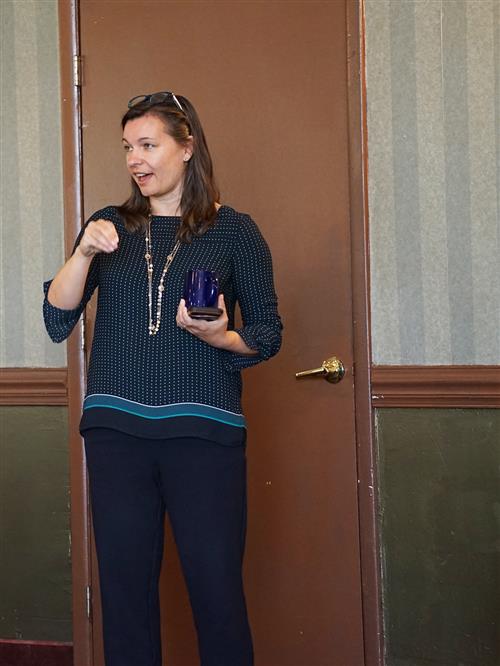Administrative Services
Page Navigation
- Administrative Services
- Evaluation, Grants & Data
- Finance & Business Operations
- Human Resources
- Marketing & Strategic Communication
- Project SEEKS SES
- Technology Services
- Safety & Security: Services & Support
- Special Education Administrative Support
- Diversity, Equity & Inclusion
- BridgeUP
"I’m very optimistic and excited": Project SEEKS SES and the Office of Child Development partnering together
Posted by Jeremy Tepper on 5/23/2023

A few years ago, the University of Pittsburgh and the Office of Child Development started pitching a program about positive racial identity, entitled P.R.I.D.E (Positive Racial Identity Development in Early Education).
No institution felt comfortable taking on the program, so the University of Pittsburgh started it themselves, slowly easing it into the systems they work with. Now P.R.I.D.E has started to pick up steam, so much so that it’s become more systematic and built-in without needing the University of Pittsburgh to facilitate the work.
Shannon Wanless, the director of the Office of Child Development, sees Project SEEKS SES in a similar light, except for Social-Emotional Learning (SEL), a type of learning that aims to foster social and emotional skills within school-aged children.
“It’s really trying to bring a focus on it and say we have these resources. I’m hoping what we can do is push people’s thinking beyond what seems possible right now in their institution right now,” Wanless said.
“I’ve been longing for this moment for this to happen in Pennsylvania, and it feels like we’re at a crossroads where this can really happen, so I’m very optimistic and excited about what this can mean for the children we have in school right now.”
Wanless sees the goals of Project SEEKS SES and the Office of Child Development similarly. They both want to help support children and communities in an equitable manner, and they both want to make these supports more systematic. As Project SEEKS SES moves forward, the Office of Child Development will be a key partner.
“We definitely align. The Office of Child Development has been around for over 35 years, and everything we’ve done over that time has been to try and push the local institutions and systems to go beyond what seems possible right now to help children and families thrive,” Wanless said.
“Our role is to convene these folks, give them a lot of information and training on SEL and give them a chance to work together to start supporting that goal and support the school so the school doesn’t feel like it’s in isolation in teaching SEL, but rather its in a SEL rich ecosystem in their neighborhood.”
As the research on SEL has piled up, its importance has become apparent, Wanless said. As school districts and systems progress, Wanless believes teaching SEL is crucial.
“There have now been decades of research studies showing that attention to SEL skills in developing children relates to their academic and lifelong success,” Wanless said.
“If schools view their ultimate goal as helping kids read, write and secure careers and be successful later in life in the workplace, then you can really see the tight connection to having social and emotional skills.”
Although realization of the importance of SEL has grown, Wanless said integration hasn’t been as seamless. School districts might be overwhelmed with the amount of SEL curriculums available to them, and might have trouble figuring out exactly how to fit it into a school day. There is also an interesting dynamic between SEL and those teaching it.
“It’s maybe the only topic in school where we’re asking adults to teach something that they never really learned themselves,” Wanless said.
For proper SEL integration, Wanless said schools and systems need all hands on deck. If schools and the resources around them can work together and speak a similar language in regards to SEL, then it can be effectively integrated.
“We put an enormous amount of weight on schools, but in reality, children are not only developing when they’re in the school building. They spend a lot of hours in other places as well, and there are a lot of resources in Allegheny County,” Wanless said.
“We have an incredible amount of resources and programs floating around the county, and the more they can work in partnership with the school, then you get synergy, rather than isolating schools and telling them to figure it out while the kids are there.”
As things move forward, the Office of Child Development and Project SEEKS SES will both attempt to act as connectors and facilitators, connecting school districts with the resources around them, so that SEL and mental and behavioral health supports become more built-in.
“Wrapping an ecosystem around them of all of those folks that have more skills in SEL, that have resources like clinicians when mental health supports are needed and are already in the neighborhoods that the schools are in, then the child and the family really get access to the full breadth of supports that are needed,” Wanless said.
“We really need to make these relationships a lot more systematic and sustainable among the community organizations and schools.”


You are commenting as Anonymous